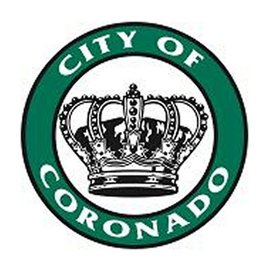The March 1 city council meeting was not a good one for Councilman Richard Bailey. Two of the three proposals he had brought to the council were shot down. Without taking a formal vote, the council refused to agendize the campaign finance reform measures he had advocated or to order the removal of any of the street signs Bailey thought were superfluous.
Only his request to extended the sidewalk on Ocean Boulevard, to include the perimeter of Sunset Park that borders it, mustered support with the council voting unanimously to add the issue to a future meeting.
Back in August Bailey suggested that the council take a hard look at street signs and see if it were possible to remove some of them. The council agreed unanimously to direct staff to study Bailey’s argument that “the number of signs our small community has installed around town creates visual clutter and distracts from our neighborhoods.”
To support his contention he provided a list of 131 signs that he believed were superfluous or inconsistent. One example is why a no parking sign had to be posted where the curb was already marked.
Common sense aside, there appears to be a legal justification for having more signs that most people would consider necessary to enforce local ordinances and to avoid litigation.
For example, speed bump signs have to be a certain distance ahead of the bump so a driver has time to slow down before he reaches it. If the bump were to damage the frame of a car, the owner would have a case, City Manager Blair King pointed out.
After working through Bailey’s list and casting about for other potentially superfluous signage, the staff could only suggest removing “no vehicles for sale” and ones directing people how to evacuate ahead of a tsunami.
If a warning were sounded that a seismic sea wave was approaching no one would need a sign to know which way to head, everyone would know where to go. “There are only two ways to get off the island,” Maurer said.
The signs were originally installed to meet a criterion for a National Oceanic and Atmospheric Administration (NOAA) tsunami ready designation. The agency doesn’t offer any benefits, such as funding, for meeting its criteria. “It’s just a designation from NOAA,” said King.
Still the council was reluctant to remove even these. “I voted for it,” Mayor Casey Tanaka said, adding that he had done so at the request of a former council member. “It would be a disservice to that council member if I voted to remove the signs [as well as] unfair and disingenuous.”
The council took the staff report “under advisement” and directed the city staff to keep an eye out for needless signs and bring them to the council’s attention.
The council also rejected Bailey’s suggestion to agendize reforming the city’s campaign finance ordinance at a future city council meeting. According to Bailey the 1994 ordinance differs from rules established by the Fair Political Practices Commission and those of other cities in San Diego County.
They allow people to contribute to local campaigns using a credit card or an electronic transfer and to lift restrictions on home and office fundraisers at a future city council meeting. Under the ordinance only personal checks are allowed.
Bailey also wanted to increase the amount someone could donate at home or office fundraisers from $200 to $500. He argued that when someone holds a fund raiser in their home they are making a non-monetary contribution and the fair market value of renting that space has to be considered.
“Given the value of real estate the fair market value of any real estate would easily exceed $200, which would inadvertently cause an illegal non-monetary contribution,” he said. City Attorney Johanna Canlas said that there was no mention of fair market value in FPPC rules.
The request was rejected primarily because of the timing of Bailey’s request. “We’re in the middle of a campaign,” Harold Myers pointed out. “You don’t change the rules in the middle of the game.”
Besides, insisting on personal checks insures transparency by “allowing you to follow the money,” Myers added.
He reminded the council that this city ordinance was passed in 1994 after a special interest group made undisclosed contributions to three city council candidates to create a pro-tourist majority.
Tanaka agreed that only allowing people to contribute to a campaign with a personal check allowed complete transparency. “You can easily save the evidence.” Bailey pointed out that credit card contributions could be recorded and posted as easily as those made by check. “It’s not true that the contributions would be hidden.” Indeed, FPPC rules require people making contributions to a political candidate, whether by check or electronic transfer, to fill out a form that includes their occupation and employer.
While defending the status quo, Tanaka suggested that another council might want to take up the matter after the election. Both he and Councilman Mike Woiwode are termed out this year and will be leaving the council in January. Bailey and Councilwoman Carrie Downey are campaigning to replace Tanaka as mayor. She also supported rejecting Bailey’s request.
Bailey did have one powerful voice in his corner. Coronado Happenings‘ editor Charles Crehore. “It seems like horse and buggy to me,” he said. “Everything I do, I do electronically. If I had to write a check I’d have to go to the bank to get one.” The electronic versus paper controversy spurred by Bailey’s proposal continued on Happenings with the mayor joining the conversation to defend the status quo.





